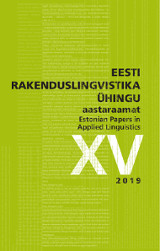Setting the boundaries: Partitive verbs in Estonian verb classifications
Setting the boundaries: Partitive verbs in Estonian verb classifications
Author(s): Natalia Vaiss, Anne TammSubject(s): Syntax, Lexis, Language acquisition, Finno-Ugrian studies
Published by: Eesti Rakenduslingvistika Ühing (ERÜ)
Keywords: aspect; telicity; boundedness; resultativity; transitivity; object; second language; lexicography; Estonian;
Summary/Abstract: The paper examines a class of Estonian transitive verbs referred to as ‘partitive verbs’: verbs that appear with partitive-marked objects. This class is more heterogeneous than previously assumed. Firstly, there are verbs that cannot have total (accusative) objects. Secondly, there are verbs that can have total objects in lexically restricted combinations. Thirdly, some verbs combine freely with a boundary marking element. Finally, there is a group of less studied verbs that normally represent unbounded situations but nevertheless allow total object marking if the context highlights the boundary of a situation or result. We clarify the conditions of partitive verbs appearing with total objects, hoping to enhance Estonian L2 instruction and lexicography.
Journal: Eesti Rakenduslingvistika Ühingu aastaraamat
- Issue Year: 2019
- Issue No: 15
- Page Range: 159-181
- Page Count: 23
- Language: English

